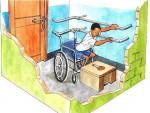Your profile reflects your reputation, it will build itself as you create new debates, write arguments and form new relationships.
Make it even more personal by adding your own picture and updating your basics.

| Reward Points: | 1 |
| Efficiency:
Efficiency is a measure of the effectiveness of your arguments. It is the number of up votes divided by the total number of votes you have (percentage of votes that are positive). Choose your words carefully so your efficiency score will remain high. | 100% |
| Arguments: | 1 |
| Debates: | 0 |
Whilst I agree that a range of governments and NGos and other organisations have supported improvement of some WASH in schools as well as schools themselves, I also agree with the comments above re the scale of the problem has not been responded to with the scale of resources required. This is one area where we have so far failed. In Tanzania during 2009-2010, SNV/WaterAid/UNICEF undertook a detailed mapping project of the real situation on the ground in school WASH. It mapped 2697 pre-, primary and secondary schools, about 1/6 in the whole country and found that: only 11% reached the current Ministry of Education standard ratio for latrine drop holes, 20% have more than 100 pupils per drop hole and 6% have no latrines; 96% did not have sanitation suited for people with disabilities; 52% of girls latrines did not have doors (boys a similar number); 92% did not have functional hand-washing facilities; and 99% did not have soap. The quality of construction and maintenance / governance also varied dramatically, something that does not show up well on the regular data collection. Using the data from the school WASH mapping and using a range of costs from different organisations who had been implementing school WASH a very basic calculation was undertaken. This indicated that to bring all schools in Tanzania up to a basic minimum standard, a sum in the region of USD 3.2 million would be needed for each district on average, and about USD 0.5 billion for the whole country. These figures do not include the organisation / institutional costs or overheads for managing the implementation / follow up etc and do not consider population growth, both of which would add significantly to the cost. This could mean a real price tag of maybe USD 1 billion or 1.5 billion considering the number of years it is likely to take to bring all up to a basic minimum standard. In some countries including Tanzania there are SWAps for water supply, the Tanzanian one having a nominal contribution to household and school sanitation. The 'Water' SWAP for Tanzania (one of, or the largest in Sub-Saharan Africa) has a target budget of USD 2.89 billion for a 20 year period, and has most of the large donors supporting it (but even with this it is still estimated that these funds will not be able to keep pace with population growth let increase access to water supply for all Tanzanians from the current situation). School WASH would require a maybe half of this whole budget, but the focus on school WASH and the resources had not until recently been on the national government or donor agenda except for supporting occasional projects or programmes. This is the challenge for resourcing for school by not being more realistic in identifying the real resources that are needed to be able to respond to this huge problem at scale. Solving school WASH is not as simple as giving out a mosquito net or a Vitamin A tablet which are now being done at scale. But as a sector we have to start thinking bigger...
|
||||||||||